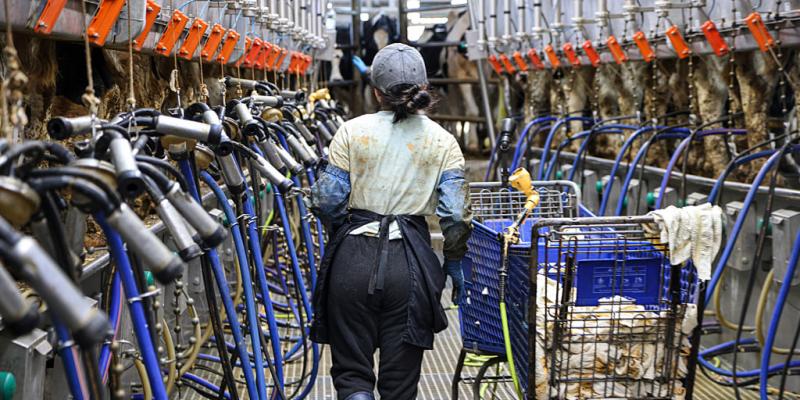Some may have bird flu infection without any symptoms, CDC reports
Category: News & Politics
Via: perrie-halpern • 5 months ago • 0 commentsBy: Erika Edwards and Mustafa Fattah



Dairy workers who've been exposed to bird flu should be tested for the virus even if they don't have symptoms and be offered Tamiflu to cut their risk of getting sick, the Centers for Disease Control and Prevention said Thursday.
The recommendation coincides with a new report finding asymptomatic bird flu infection in some workers. Those cases were discovered using blood, or serology, testing and seem to have been transmitted from sick animals, not people.
"There is nothing that we've seen in the new serology data that gives us any concern about person-to-person transmission," Dr. Nirav Shah, the CDC's principal deputy director, said during a media briefing.
To date, 46 people have been diagnosed with bird flu, also known as H5N1, in the United States this year. All but one of those patients had been exposed to sick cattle or poultry on farms.
Most cases have been reported in California (21), Washington (11) and Colorado (10).
The new CDC study looked at blood tests from workers at 115 dairy farms who were exposed to H5N1 over the summer in either Colorado or Michigan.
Of those 115, eight (7%) had antibodies showing they'd been infected with the bird flu.
"All eight reported milking cows or cleaning the milking parlor," Dr. Demetre Daskalakis, who heads the CDC's National Center for Immunization and Respiratory Diseases, said during the call. Masks and safety goggles were rare.
"None wore respiratory protection, and less than half wore eye protection," Daskalakis said.
Most of those found with H5N1 said they'd had red, itchy eyes with drainage.
But four of the eight who were infected didn't recall ever being sick.
Until now, workers who had a known exposure to bird flu but didn't have symptoms haven't been routinely tested. The new results clearly show cases have been missed — a concern that veterinarians have had since the spring.
The CDC is now "intensifying" recommendations meant to protect farmworkers, Shah said. "We in public health need to cast a wider net in terms of who is offered a test so that we can identify, treat and isolate those individuals," he said.
The new advice is to test anyone with a significant bird flu exposure, such as an unprotected worker who's been splashed in the face with raw milk on a dairy farm with known H5N1 infections in the herds.
Even if the person never feels ill, that worker should be tested and given the antiviral drug Tamiflu to reduce their risk of ever developing symptoms or passing the virus to close contacts.
It was unclear Thursday where the money for extra tests would come from, but a CDC spokesman said the cost would not fall on individual farms.
This is a move the CDC should have made months ago, said Jennifer Nuzzo, director of the Pandemic Center at the Brown University School of Public Health.
"We've always suspected strongly and now have confirmation that that was going to miss people who are infected," Nuzzo said. "This is very bad because one of these infections could turn out to be serious."
All the H5N1 cases reported so far this year have been mild, including pinkeye and some minor coughs or sneezes. No one has died.
That runs counter to previous H5N1 mortality rate estimates from other parts of the world suggesting more than half of those who become infected die.
Daskalakis said that could be because "not all H5N1s are built the same. These are potentially different genotypes."
There is no indication that the commercial milk or beef supplies have been affected, the Food and Drug Administration has said.

